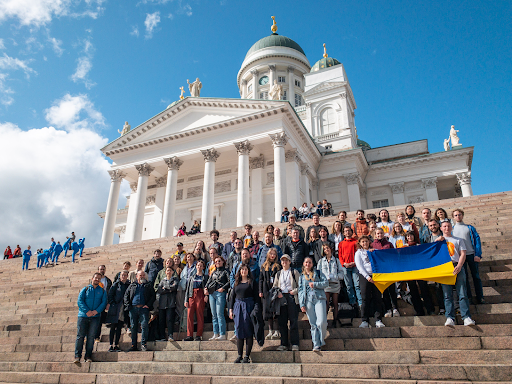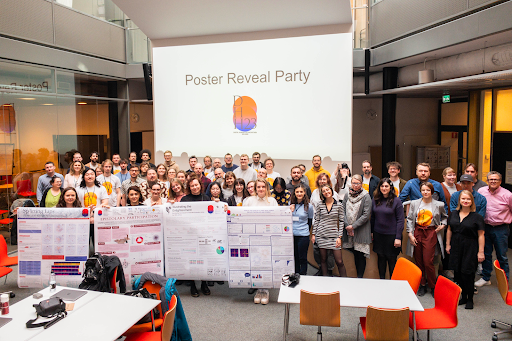The Helsinki Digital Humanities Hackathon #DHH23 gathered students and researchers of humanities, social sciences, and computer science in May and June (24.05.–02.06.2023) at the University of Helsinki. During a week and a half of intensive multi-disciplinary work, the groups applied digital methods to a variety of datasets, with the goal of addressing research questions in the following areas:
- Epistolary exchanges
- Interactional dynamics of online discussion
- Early modern images
- Political polarisation in the parliament.

The event was organised as an international summer school by the University of Helsinki and Aalto University, with financial support from CLARIN , DARIAH ERIC, and the Helsinki Institute for Information Technology. The Hackathon participants were from 13 different countries and were divided into four thematic groups.
Thematic Groups
Epistolary Participation
The Epistolary participation group focused on the connections between letter-writing and the rise of literacy within the 19th century in Finland. By analysing two different datasets, CoCo dataset consisting of letter metadata from the period of the Grand Duchy of Finland, as well as Translocalis, a dataset made of Finnish newspapers’ readers’ letters from 1775 to 1885, the group discussed occupational sectors, epistolary literacy, travel patterns, as well as analysed the importance of bias in the datasets themselves. See the poster here.
Members (12 persons): Alie Tacq, Anna Moschitta, Efthymios Kokordelis, Elias Mucha, Imama Alishova, Koldo Garai, Lilli Peura, Michele Stefani, Olof Falk, Ruxandra Gidei, Tetiana Shyshkina, Ville-Pekka Kääriäinen.
Interactional Dynamics of Online Discussion
The Interactional dynamics of online discussion group explored the ways in which a specific group of people interacts with one another as well as the outside world – focusing on a dataset of discussions on a forum of incels (involuntary celibate; people ‘who feel unable to find a sexual or romantic partner and express hatred towards those they blame for this’). They strove to find out how the members talk to each other, group themselves together, and see the key differences between themselves and others they deem unfit to be part of the closed group. See the poster here and GitHub repository here.
Members (10 persons): Selenia Anastasi, Yan Asadchy, Nina Eckertz, Annika Grützner-Zahn, Nina Jokirinne, Milja Ketoja, Kerstin Marki, Harri Haralds Matulis, Siyi Wang, Laura Chilla.

Early Modern Images
The Early modern images group was the only one to focus on images – particularly on the evolution of scientific illustrations during the 18th century. By analysing over 100,000 pages of images from the ECCO scientific collection, they showed the different ways in which particular genres of illustrations were used, while also noting how much the practice of illustrating evolved over time and was closely tied to technological, social and cultural development. See the poster here and GitHub repository here and here.
Members (10 persons): Mourad Boumlik, Prolet Decheva, Lenka Kalvodová, Linda Nurmi, Ánh Dương Nguyễn, Magdalena Piotrowska-Grot, Telma Peura, Reetta Sippola, Aleksi Suuronen, Ari Vesalainen.
Political Polarisation in the Parliament
The Political polarisation in the parliament group strove to explore the phenomenon of political division by discovering the differences in different countries’ parliamentary speeches. Using the ParlaMint corpora of parliamentary debates, with a specific focus on Great Britain, Hungary, Slovenia and Ukraine, they analysed how different topics of debate are affected by polarisation, its temporal changes, as well as how well these kinds of trends can be measured computationally. See the poster here and GitHub repository here.
Members (12 persons): Anna Krvvenko, Ari-Heikki Rintaniemi, David Bordon, Ekaterina Glazacheva, Katia Meden, Mark Mets, Nikoletta Jablonczay, Paul Pope, Pontus Hedlund, Topi Ranta, Vadym Kuzyak, Vid Klopčič
Feedback
According to the feedback, participants seem to have had a great time working together on this interdisciplinary project with people from all over the world and different backgrounds. Moving forward, it is apparent that still greater attention needs to be devoted to resolving organisational matters, such as communication about different roles in groups and ensuring alignment among individuals regarding different aspects of group work (for example, clearer instructions with respect to division of labour). It is important to note that the hackathon is an event that is constantly improving, largely thanks to the feedback we get from participants, so all positive notes, as well as constructive criticism, are taken into consideration.
More information about DHH23, including the groups’ posters can be found here, as well as on the Instagram and Twitter accounts.
Overall Organisers
- Mikko Tolonen, Professor in computational history, University of Helsinki
- Eetu Mäkelä, Associate Professor in human sciences – computing interaction, University of Helsinki
- Jukka Suomela, Associate Professor in distributed algorithms, logic and complexity, Aalto University
- Jouni Tuominen, University Researcher at HSSH, University of Helsinki; Staff Scientist, Aalto University.
Team Leaders and Consultants
- Petri Leskinen, Doctoral Researcher, University of Helsinki
- Caitlin Burge, Postdoctoral Researcher, University of Luxembourg
- Ilona Pikkanen, Research Manager, Finnish Literature Society
- Pihla Toivanen, Doctoral Researcher, University of Helsinki
- Ümit Bedretdin, Grant Researcher, University of Helsinki
- Yann Ryan, Postdoctoral Researcher, University of Helsinki
- Iiro Tiihonen, Doctoral Researcher, University of Helsinki
- Ville Vaara, Doctoral Researcher, University of Helsinki
- Risto Turunen, Doctoral Researcher, University of Tampere
- Jani Marjanen, University Lecturer, University of Helsinki
- Bojan Evkoski, Researcher, Jozef Stefan Institute
- Narges Azizi Fard, Postdoctoral Researcher, University of Helsinki
- Emilia Lounela, Doctoral Researcher, University of Helsinki
- Laura Lehmuskoski, Doctoral Researcher, University of Helsinki
- Dayei Oh, Postdoctoral Researcher, University of Helsinki
- Feeza Vasudeva, Postdoctoral Researcher, University of Helsinki.